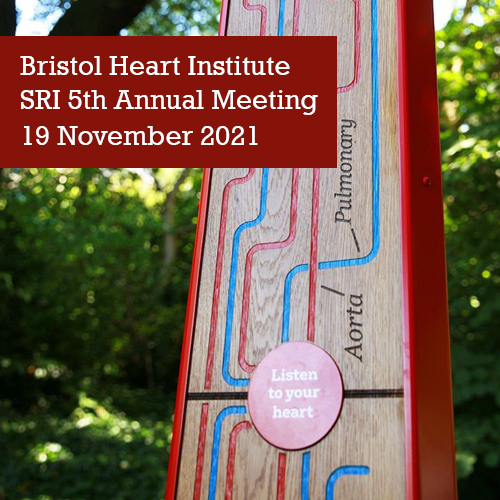
Eighty Bristol Heart Institute researchers joined ‘Fostering collaboration and supporting early career researchers’, our 5th Annual Meeting on 19 November 2021. The day was an opportunity not only to get to know some of the research taking place in the University’s Specialist Research Institute, but also the researchers driving it forward.
BHI researcher talks
In the first session on cardiac surgery, Massimo Caputo looked at tissue engineering, combining surgical facilities and imaging technologies in ‘hybrid’ theatre, cardiac 3D printing to help plan operations and how advances in VR technology are taking this to the next level.
Next, Tom Johnson, Consultant Cardiologist and recently appointed Associate Professor, examined a range of cardiovascular research priorities, from intracoronary imaging to industry collaboration, AV Cath lab broadcasting to encourage collaboration and the potential for system-wide datasets to enhance patient outcomes.
Jules Hancox from the School of Physiology, Pharmacology and Neuroscience shared some thoughts on career progression for early career researchers, including memorable advice about choosing a research project: “Interesting is not equivalent to important” – a trap that all researchers fall into from time to time, he acknowledged!
To wrap up the morning’s talks, Deborah Lawlor discussed Bristol’s epidemiological research in the BHI.
Plenary
For the plenary we welcomed Professor Andrew Taylor, Director of Innovation at Great Ormond Street Hospital and Head of Cardiovascular Imaging at UCL Institute of Cardiovascular Science, to talk about innovating in cardiovascular research. Using examples such as fast imaging protocols and the potential for delivering precision medicine via AI, he looked at why putting innovations into clinical practice at pace remains challenging, and how ongoing interaction between researchers and clinical teams is vital.
Quickfire presentations
BHI PhD students and early career researchers were invited to present their work in five minutes in three themed sessions covering epidemiology, basic science and clinical research. Attendees voted for the best presentation in each session – well done to:
- Lucy Goudswaard: “Combining Mendelian randomisation and randomised control trial study designs to determine effects of adiposity on the plasma proteome”
- Stanley Buffonge: “The battle to protect the coronary microvascular endothelial glycocalyx in diabetes”
- Monica Gamez: “Endothelial glycocalyx heparan sulfate contributes to the integrity of the blood-retina-barrier and can be therapeutically targeted in diabetes mellitus”
Thank you
Thanks to everyone who took part in the meeting and especially to the organising committee, without whom the day wouldn’t have been possible: Alexander Carpenter, Alba Fernandez-Sanles, Laura Pannell, Eva Sammut and Andrew Shearn, along with Giovanni Biglino and Stuart Mundell.
Laura says:
“It was a fantastic day showcasing research the BHI can be proud of, and will enable the development of collaborative relationships for many years to come!”

